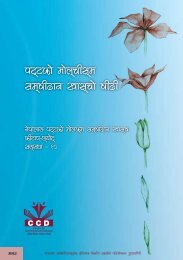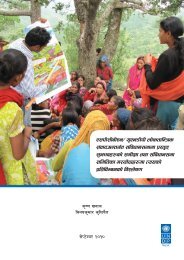The Dalits of Nepal and a New Constitution - ConstitutionNet
The Dalits of Nepal and a New Constitution - ConstitutionNet
The Dalits of Nepal and a New Constitution - ConstitutionNet
You also want an ePaper? Increase the reach of your titles
YUMPU automatically turns print PDFs into web optimized ePapers that Google loves.
<strong>The</strong> <strong>Dalits</strong> <strong>of</strong> <strong>Nepal</strong> <strong>and</strong><br />
a <strong>New</strong> <strong>Constitution</strong><br />
57<br />
1990 <strong>Constitution</strong> Interim <strong>Constitution</strong><br />
Comment<br />
shall be a bar to providing<br />
by law for compulsory<br />
service for public purposes.<br />
enactment <strong>of</strong> a law requiring citizens to be engaged in<br />
compulsory service for public purposes.<br />
Note that the proviso requires a<br />
law - custom that involves labour<br />
for community services would not<br />
be enough.<br />
No equivalent<br />
Article 33 Responsibilities <strong>of</strong> the State:<br />
<strong>The</strong> State shall have the following responsibilities:<br />
(d) To carry out an inclusive, democratic <strong>and</strong> progressive<br />
restructuring <strong>of</strong> the State by eliminating its existing form <strong>of</strong><br />
centralized <strong>and</strong> unitary structure in order to address the<br />
problems related to women, <strong>Dalits</strong>, indigenous tribes,<br />
Madhesis, oppressed <strong>and</strong> minority community <strong>and</strong> other<br />
disadvantaged groups, by eliminating class, caste, language,<br />
gender, culture, religion <strong>and</strong> regional discriminations,<br />
(d1) To enable Madhesi, <strong>Dalits</strong>, indigenous ethnic groups,<br />
women, labourers, peasants, the physically impaired,<br />
disadvantaged classes <strong>and</strong> disadvantaged regions to participate<br />
in all organs <strong>of</strong> the State structure on the basis <strong>of</strong> proportional<br />
inclusion,<br />
(e) To formulate a common minimum programme for socioeconomic<br />
transformation to eliminate all forms <strong>of</strong> feudalism<br />
<strong>and</strong> implement it gradually,<br />
(f) To pursue a policy <strong>of</strong> adopting scientific l<strong>and</strong> reform<br />
programmes by gradually ending feudalistic l<strong>and</strong> ownership,<br />
(i) To adopt a policy <strong>of</strong> ensuring socio-economic security <strong>and</strong><br />
provide l<strong>and</strong> to the economically backward classes, including<br />
the l<strong>and</strong>less, bonded labourers, tillers <strong>and</strong> shepherds<br />
<strong>The</strong>se come in a chapter <strong>of</strong> the<br />
<strong>Constitution</strong> that cannot be used<br />
as the basis <strong>of</strong> a legal claim.<br />
Article 25 Directive<br />
Principles <strong>of</strong> the State<br />
(1) It shall be the chief<br />
objective <strong>of</strong> the State to<br />
promote conditions <strong>of</strong><br />
welfare on the basis <strong>of</strong> the<br />
principles <strong>of</strong> an open<br />
society, by establishing a<br />
just system in all aspects<br />
<strong>of</strong> national life, including<br />
social, economic <strong>and</strong><br />
political life, while at the<br />
same time protecting the<br />
lives, property <strong>and</strong> liberty<br />
<strong>of</strong> the people.<br />
(2) <strong>The</strong> fundamental<br />
economic objective <strong>of</strong> the<br />
Article 34 Directive Principles <strong>of</strong> the State:<br />
(4) <strong>The</strong> fundamental economic objective <strong>of</strong> the State must be<br />
to give priority <strong>and</strong> protection to making the national economy<br />
independent, self-reliant <strong>and</strong> progressive by preventing the<br />
concentration <strong>of</strong> available resources <strong>and</strong> means <strong>of</strong> the country<br />
within a limited section <strong>of</strong> society, by making arrangements<br />
for equitable distribution <strong>of</strong> economic gains based on social<br />
justice, by making such a provision as will prevent economic<br />
inequality <strong>and</strong> exploitation <strong>of</strong> any caste, gender, tribe, origin<br />
or individuals, <strong>and</strong> by giving priority <strong>and</strong> encouragement to<br />
national private <strong>and</strong> public enterprises.<br />
(5) <strong>The</strong> social objective <strong>of</strong> the State shall be to establish <strong>and</strong><br />
develop a healthy social life on the foundation <strong>of</strong> justice <strong>and</strong><br />
morality, by eliminating all types <strong>of</strong> economic <strong>and</strong> social<br />
inequalities <strong>and</strong> by establishing harmony among diverse caste,<br />
tribe, religion, language, race, community <strong>and</strong> religious groups.<br />
<strong>The</strong>se are also not legally<br />
enforceable rights.<br />
Cont...


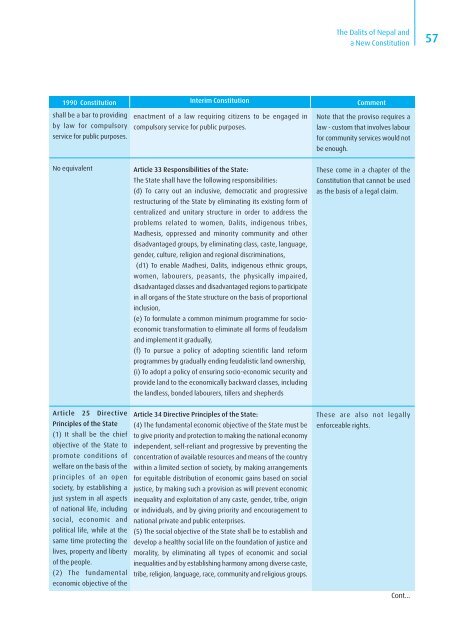

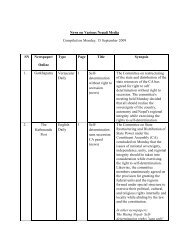

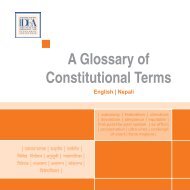
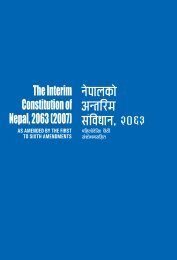
![g]k fnsf blntx? / gofF ;+l jwfg](https://img.yumpu.com/49483602/1/184x260/gk-fnsf-blntx-goff-l-jwfg.jpg?quality=85)
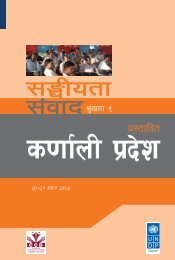

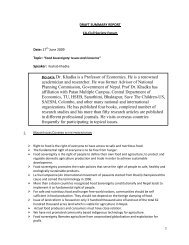
![+ljwfg;ef, /fHosf]k'g](https://img.yumpu.com/41604075/1/184x260/-ljwfgef-fhosfkg.jpg?quality=85)
